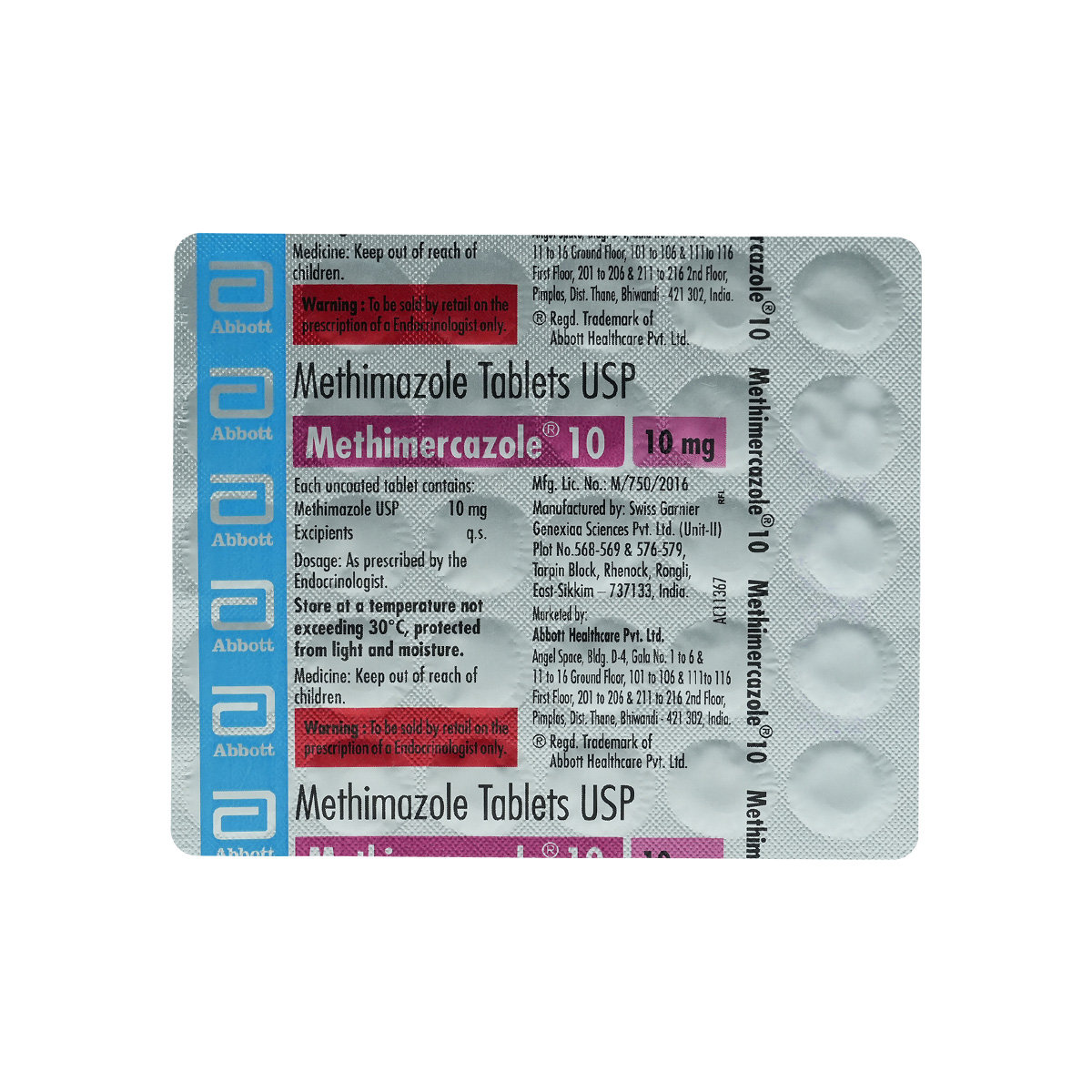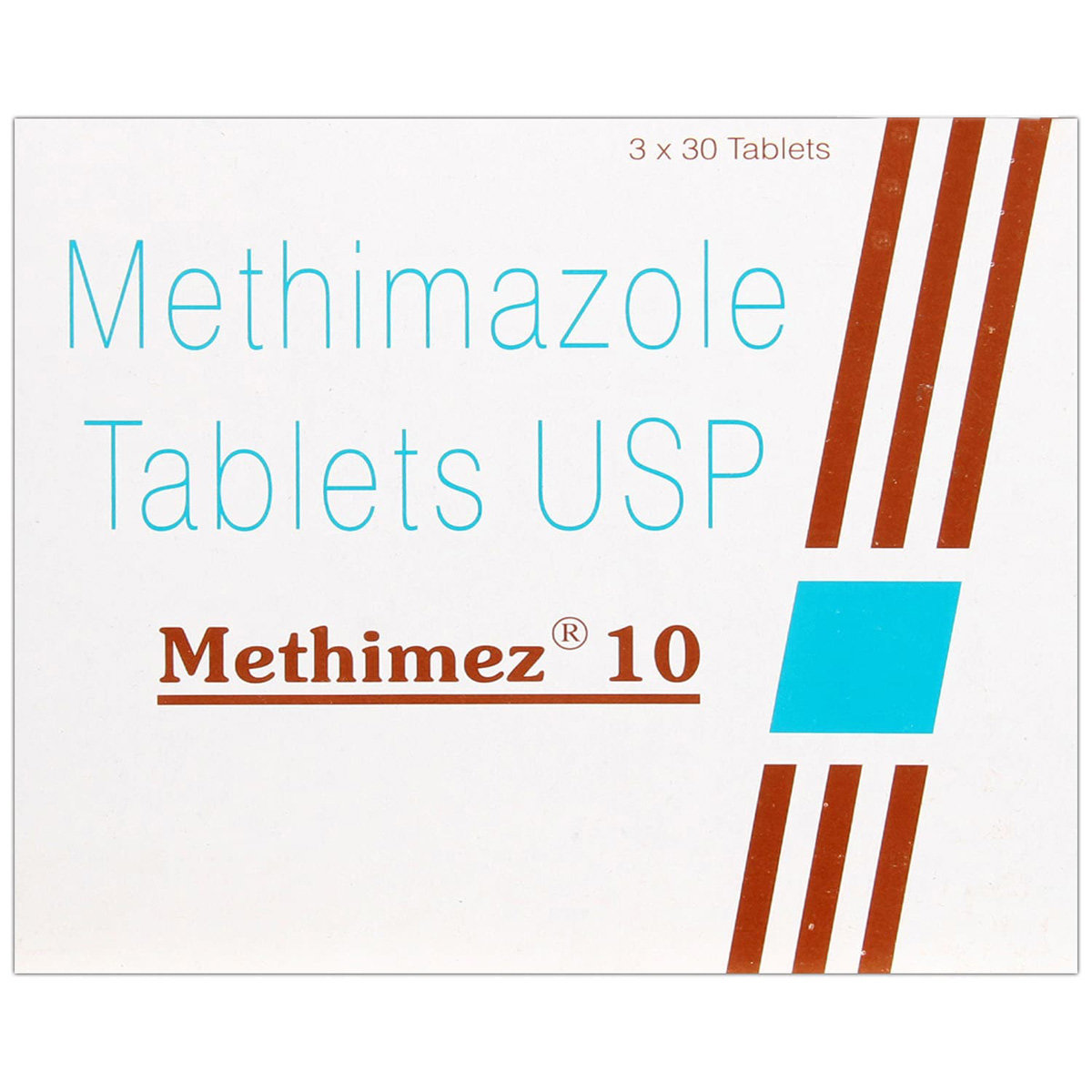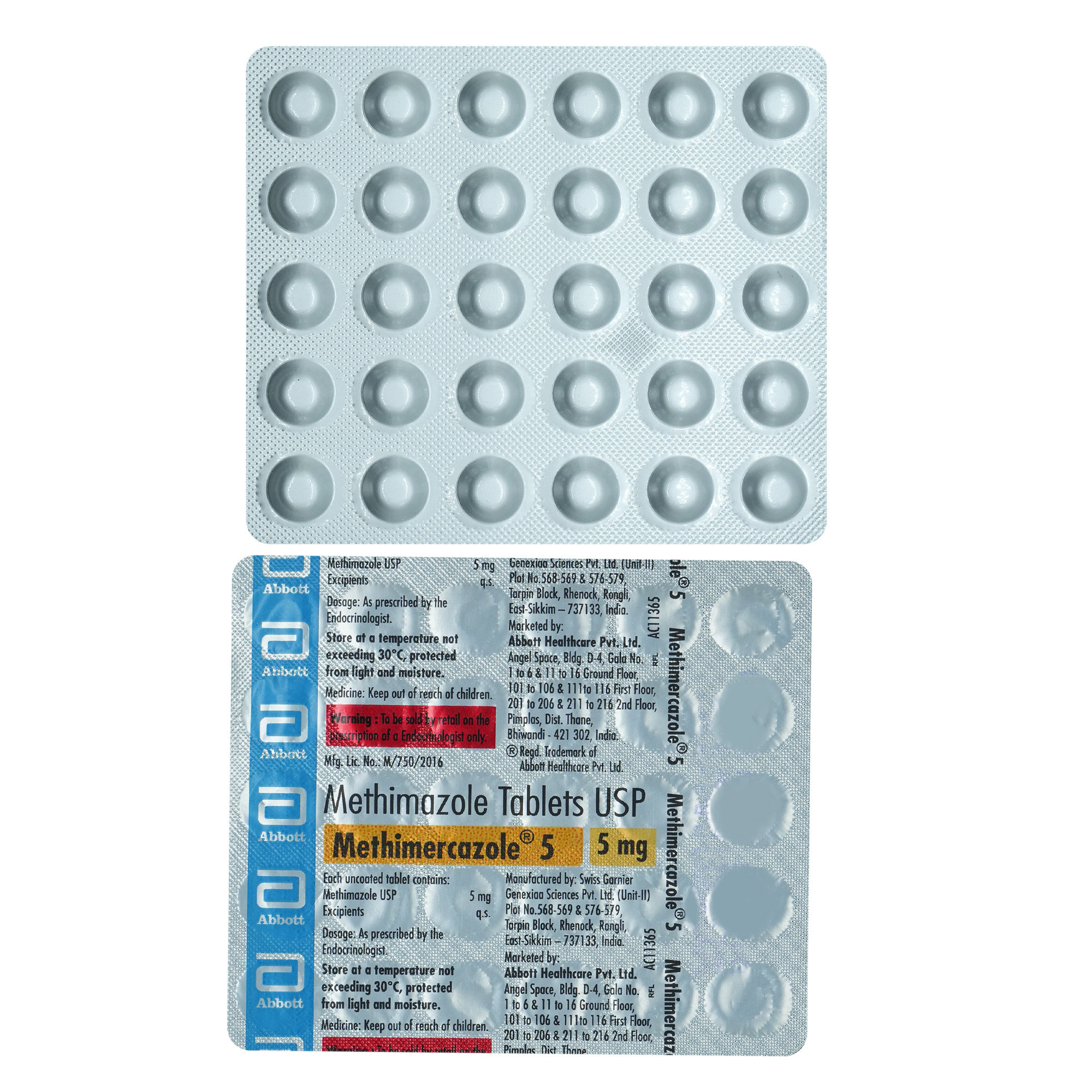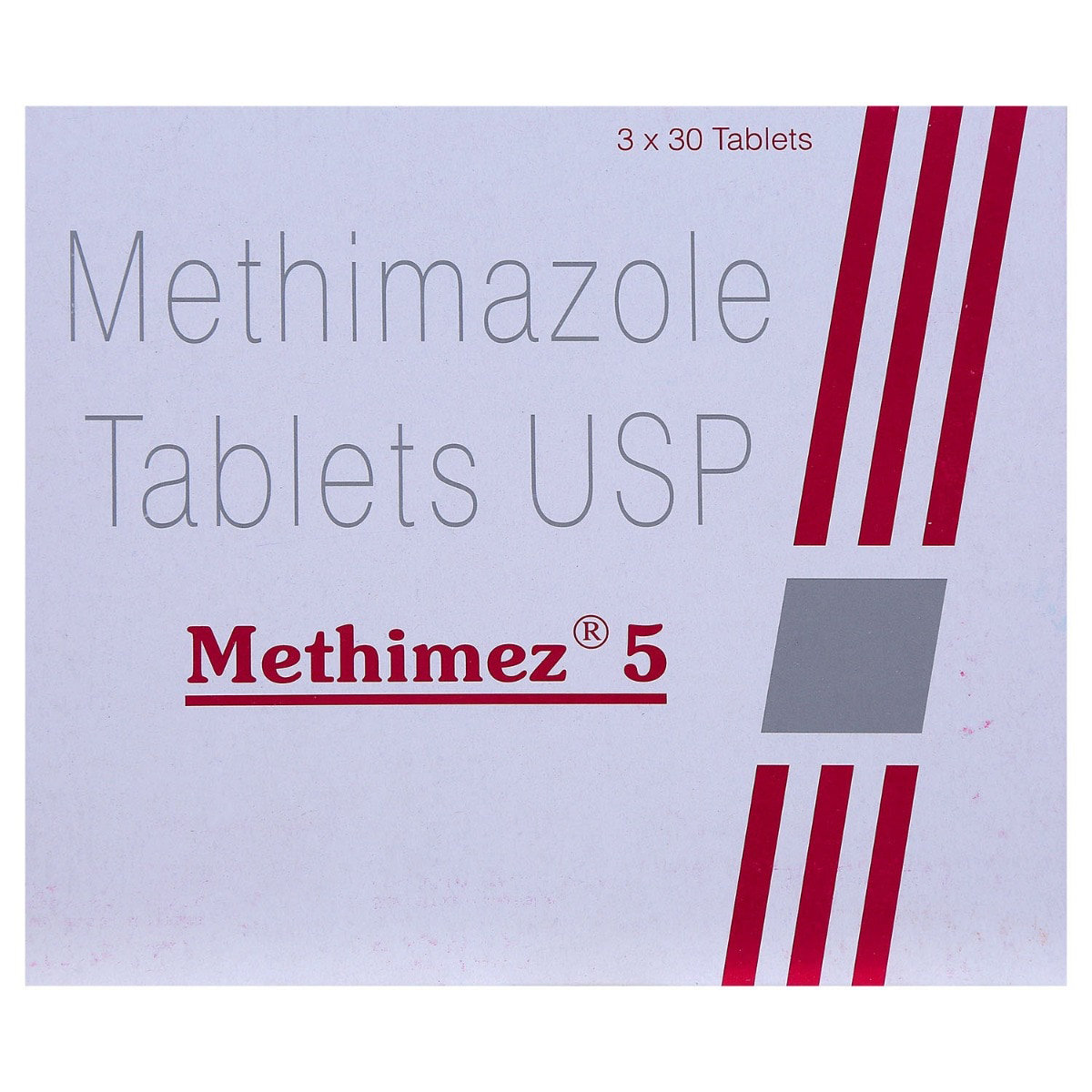Methimazole
About Methimazole
Methimazole belongs to the class of ‘anti-thyroid agents,’ primarily used to treat an overactive thyroid (hyperthyroidism) and Graves disease. Methimazole is also used before thyroid surgery and radioactive iodine treatment. Hyperthyroidism is a condition associated with too much production of a hormone called thyroxine by the thyroid gland. The thyroid gland is a butterfly-shaped endocrine gland located in the base of your neck. Graves disease is an autoimmune disorder that causes hyperthyroidism.
Methimazole contains ‘Methimazole’, which belongs to the class of ‘Anti-thyroid agents’. It is considered a first-line medicine for treating hyperthyroidism and Graves disease. Methimazole works by reducing the excessive production of thyroid hormones from the thyroid gland, thereby preventing hyperthyroidism symptoms.
Your doctor will advise the appropriate dose that suits your medical condition. Common side effects of Methimazole include headache, stomach upset, nausea, vomiting and mild skin rash or itching. These side effects may not occur in every patient using this medication and differ individually. If the side effects persist longer or worsen, please seek a doctor’s advice.
Let your doctor know if you are sensitive to Methimazole or any other medications. Before using Methimazole, let your doctor know if you have liver, kidney or heart diseases, blood disorders and any other medical history. Methimazole is not recommended during the first three months of pregnancy. Methimazole passes into the breast milk. It is advised that pregnant and breastfeeding women should consult their doctor before using Methimazole. Methimazole is recommended for use in children only with a doctor’s advice.
Uses of Methimazole
Medicinal Benefits
Methimazole is an ‘anti-thyroid agent’, containing ‘Methimazole’. It is used to treat an overactive thyroid (hyperthyroidism) and Graves disease. Methimazole is also used before thyroid surgery and radioactive iodine treatment. It treats hyperthyroidism by inhibiting the synthesis of thyroid hormones from the thyroid gland. Methimazole is also used in patients with toxic multinodular goitre (an enlarged thyroid gland that contains masses called nodules with hypothyroidism symptoms) for whom surgery and radioactive iodine treatments are not an option. It also relieves hypothyroidism symptoms in preparation for thyroidectomy (surgical removal of whole or part of the thyroid gland) or radioactive iodine therapy.
Directions for Use
- Methimazole can be taken with or without food, as advised by your doctor.
- It is usually taken 3 times daily or as prescribed by your doctor.
- Swallow Methimazole as a whole with a glass of water.
- Do not crush, chew, or break it.
Storage
Side Effects of Methimazole
- Headache
- Stomach upset
- Nausea
- Vomiting
- Mild skin rash or itching
- Abnormal hair loss
- Loss of taste
- Abnormal sensations (tingling, prickling, burning, tightness, and pulling)
- Swelling
- Joint and muscle pain
- Drowsiness
- Dizziness
- Decreased platelet count (thrombocytopenia)
Drug Warnings
Let your doctor know if you are sensitive to Methimazole or any other medications. Before using Methimazole, let your doctor know if you have any medical history of liver or kidney diseases, congenital disorders (birth defects), hypothyroidism (low levels of thyroid hormones), blood disorders like agranulocytosis (lowered white blood cell count) and thrombocytopenia (low levels of platelets) and pancreatitis (inflammation of the pancreas, an organ behind the stomach). Please inform your doctor if you have any scheduled surgery while using Methimazole. Pregnant and breastfeeding women should consult their doctor before starting Methimazole. You may feel sleepy or dizzy while using Methimazole, hence do not drive or operate machinery until you are mentally alert. Limit your alcohol consumption during a course with Methimazole. Methimazole is recommended for use in children only with a doctor’s advice.
Drug Interactions
Drug-Drug Interaction: Methimazole may interact with blood thinners (warfarin), heart-related drugs (digoxin), respiratory drugs (theophylline) and blood pressure medicines (atenolol, carvedilol, labetalol, metoprolol, nadolol, propranolol, sotalol).
Drug-Food Interaction: No drug-food interactions found/ established. However, avoiding high sodium content foods, fatty foods and alcohol is recommended.
Drug-Disease Interaction: Brief your doctor if you have a medical history of liver or kidney diseases, congenital disorders (birth defects), hypothyroidism, blood disorders (agranulocytosis, thrombocytopenia) and pancreatitis before taking Methimazole.
Drug-Drug Interactions Checker List:
Safety Advice

Alcohol
cautionPlease consult your doctor before using Methimazole regarding the intake of alcohol during treatment. However, it is advised to limit alcohol consumption until your course is finished.

Pregnancy
cautionMethimazole is not recommended for use during the first trimester or three months of pregnancy since it can cause harmful effects on the foetus. It is advised to consult your doctor if you plan to conceive or are already pregnant before starting Methimazole.

Breast Feeding
cautionMethimazole passes into the breast milk when used by a lactating mother. Please consult your doctor before taking Methimazole if you are breastfeeding. Caution is recommended.

Driving
cautionMethimazole may make you feel dizzy and sleepy, which could affect your ability to drive or operate machines. Please do not drive or operate machines until you feel better.

Liver
cautionLet your doctor know if you have any history of liver diseases or hepatic impairment. Your doctor will weigh the benefits and potential risks before prescribing Methimazole. Regular monitoring of liver function tests is advised during course.

Kidney
cautionLet your doctor know if you have any history of kidney diseases. Your doctor will weigh the benefits and potential risks before prescribing Methimazole.

Children
cautionYour doctor will decide the dose and duration based on your child’s age and medical condition.
Habit Forming
Diet & Lifestyle Advise
- Take the medication as directed by the doctor and at regular intervals if you take Methimazole for more than once per day. Avoid or limit the intake of alcohol and caffeine.
- Manage stress, eat healthily, drink plenty of water, exercise regularly and get plenty of sleep.
- Maintain a fibre-rich diet and include healthy carbohydrates from fruits, vegetables and whole grains.
- Eat at regular intervals.
- Follow a low-sodium diet by limiting iodized salt, seafood, dairy products, high amounts of poultry or beef, high amounts of grain products like bread, pasta and pastries and egg yolks.
Special Advise
- It is advised to monitor your blood pressure and blood glucose levels regularly while using Methimazole.
- Regular monitoring of thyroid levels with T3, T4 and TSH (thyroid-stimulating hormone) tests is recommended.
- Regular monitor of liver functioning is recommended with liver function tests is recommended during Methimazole usage.
- Methimazole may cause hypoprothrombinemia (deficiency of the blood-clotting substance, prothrombin) and lead to bleeding. Hence, your doctor may advise test for prothrombin time before surgery while undergoing treatment with Methimazole.
Patients Concern
Disease/Condition Glossary
Hyperthyroidism: It is a condition associated with too much production of a hormone called thyroxine by the thyroid gland. The thyroid gland is a butterfly-shaped endocrine gland located in the base of your neck. Symptoms of an overactive thyroid include unexpected weight loss, rapid or irregular heartbeat, sweating, irritability, mood swings, weakness, sleep problems, thinning of the skin and changes in the menstrual cycle. If left untreated, hyperthyroidism can cause heart, bones, muscles, menstrual cycle and fertility problems. It is considered that women are 2 to 10 times more likely than men to develop this disease.
Grave's disease: It is an autoimmune disorder that causes hyperthyroidism. It is considered to be the primary cause of hyperthyroidism. It usually affects women under the age of 40.
FAQs
Methimazole is used to treat hyperthyroidism (an overactive thyroid) and Graves disease (an autoimmune disorder).
Methimazole consists of Methimazole, an anti-thyroid agent. It treats overactive thyroid (hyperthyroidism) and Graves disease by inhibiting the synthesis of thyroid hormones by the thyroid gland. Thus Methimazole effectively helps in treating hyperthyroidism and relieving its symptoms.
Methimazole should be used with caution and only under doctor’s supervision if you have a medical history of liver or kidney diseases, congenital disorders (birth defects), hypothyroidism (low levels of thyroid hormones), blood disorders like agranulocytosis (lowered white blood cell count) and thrombocytopenia (low levels of platelets) and pancreatitis (inflammation of the pancreas, an organ behind the stomach).
Sometimes, Methimazole may cause hypoprothrombinemia (deficiency of the blood-clotting substance, prothrombin) and lead to bleeding. Hence, your doctor may advise test for prothrombin time before surgery while undergoing treatment with Methimazole. Please seek medical advice for more information.
It is advised to regularly monitor your thyroid hormone levels with thyroid function tests while using Methimazole. If there is clinical evidence of rising serum thyroid levels, your doctor may lower the dose of Methimazole.
If you missed a dose, take Methimazole as soon as possible. However, if it is time for the next dose, skip the missed dose and go back to your regular dosing schedule. Do not double the dose.





